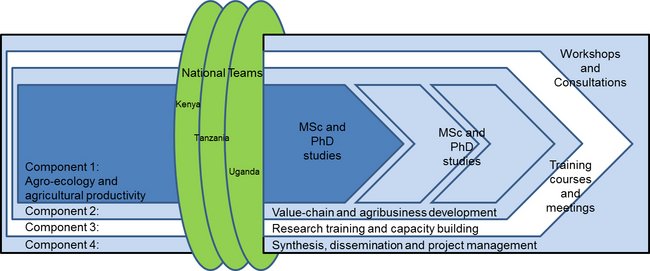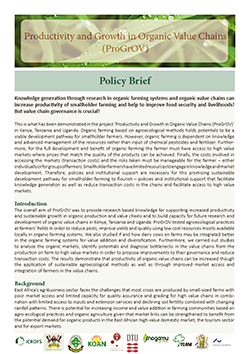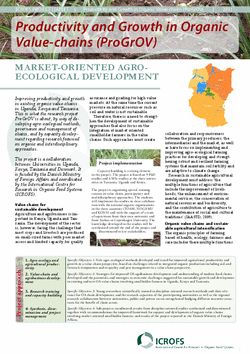About the project
Progrov team
The project ‘Productivity and Growth in Organic Value Chains' (ProGrOV), launched in January 2011 and concluded in December 2017, was funded by the Danish Ministry of Foreign Affairs.
ProGrOV focussed on improving productivity and growth in existing organic value chains in Uganda, Kenya and Tanzania through research addressing development of agro-ecological methods, governance and management of organic value-chains, and capacity development in participatory and interdisciplinary approaches.
Ideology
The project addressed research and development issues through nine PhD and six MSc studies at the African Universities and supported by Danish researchers from Aarhus University and University of Copenhagen.
In the project, production elements of organic value chains were studied with respect to how farmers’ best respond to and collaborate with the demands of the intermediaries and markets. There was focus on the: integration of livestock, product quality-soil relationship and product quality-pest management relationship for the export market, high end domestic market and the tourism sector in the three african countries.
Summary of findings
Knowledge generation through research in organic farming systems and organic value chains can increase productivity of smallholder farming and help to improve food security and livelihoods!
Organic farming based on agroecological methods holds potentials to be a sustainable development pathway for smallholder farmers. However, organic farming is dependent on knowledge and advanced management of the resources rather than input of chemical pesticides and fertilizer. Furthermore, for the full development and benefit of organic farming the farmer must have access to high value markets where prices that match the quality of the products can be achieved. Finally the costs involved in accessing the markets (transaction costs) and the risks taken must be manageable for the farmer – either individually or for groups of farmers. Smallholder farmers have limited resources to engage in knowledge and market development. Therefore, policies and institutional support are necessary for this promising sustainable development pathway for smallholder farming to flourish – policies and institutional support that facilitate knowledge generation as well as reduce transaction costs in the chains and facilitate access to high value markets.
Video: Importance of a Value Chain approach in organic agriculture research
Project concept and principles
- Value chains approach to research and innovation
- Integration of scientific disciplines and projects
- Participatory/action research
- Research in agro-ecology and agricultural productivity
- Research in value-chain development and governance
- Research training, capacity building and knowledge synthesis

Figure 1: Illustration of the project concept and design
Component 1 and 2 represent the core activities of the project – the PhD and MSc studies, and Component 3 and 4 consist of the supporting elements such as capacity building, knowledge synthesis and dissemination through training courses, workshops and consultations.![]()
More information about ProGrOV?
Read more about findings, conclusions and recommendations in the policy brief
Partners
The project was a collaboration between Makere University (Uganda), University of Nairobi (Kenya), Sokoine University (Tanzania), and Aarhus University and University of Copenhagen (Denmark). The national organic organizations from the three countries NOGAMU, KOAN and TOAM are also project participants. The project is coordinated by ICROFS.

